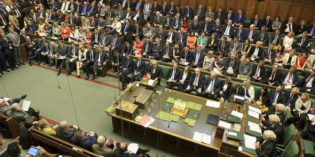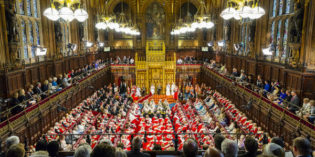Achieving accountable government

The UK shouldn’t be complacent about its high anti-corruption ranking: trouble lies ahead with Brexit
The latest edition of Transparency International’s Corruption Perceptions Index was published on 21 February. On the face of it, UK policymakers should be pleased: Britain has risen from 10th to 8th place. Daniel Hough explains why the UK shouldn’t be complacent about its cosy rating.

Engaging the public with the scrutiny of legislation requires more than just asking for their views
Cristina Leston-Bandeira and Louise Thompson examine the impact of a stage of the legislative process piloted by the House of Commons in 2013, during which the public were invited to comment on a bill undergoing parliamentary scrutiny. They explain why, despite an impressive response, the Public Reading Stage failed to make much of an impact.

The power to nudge: can we democratise choice environments?
Governments around the world have adopted ‘nudge’ strategies to change public behaviours and so implement policy goals. For some commentators, this creates concerns about transparency and democratic control. However, writes Andreas T. Schmidt (University of Groningen), within an environment where private companies frequently adopt nudge strategies, public policy nudges need not have greater implications for democracy and transparency than other forms of government intervention, and can be one tool in exerting democratic control over private sector nudge tactics.

Majoritarianism reinterpreted: why Parliament is more influential than often thought
Though Westminster is often seen as lacking the teeth to affect government policy, this is not the case, writes Felicity Matthews. She argues that reforms to shift the balance between government and parliament have served to offset the declining vote basis of government, and have ensured that Westminster remains responsive to a majority of the electorate through the legislative process.

American democracy sold to the highest bidder
If the quality of democracy is to be measured by the extent to which it constrains the economically dominant, then American democracy is failing, writes George Tyler. Recent research has shown how campaign financing is skewing policy influence towards top earners. This is in contrast to many northern European countries, which can offer practical models for the US to follow.

The Lords are unlikely to derail or overly delay the passage of the EU (Withdrawal) Bill
Richard Reid explains why the House of Lords is unlikely to derail or overly delay the passage of the European Union (Withdrawal) Bill that is about to be introduced into the Chamber. He contends that while the mood of the House regarding Brexit is difficult to tell, it seems that there is little appetite for a direct collision with the government in the form of blocking or wrecking the bill. However, we are likely to see some successful amendments regarding the acquis, devolution and Parliamentary sovereignty that will win support from across the party groupings.

Just how special are special advisers within the UK civil service?
Using the most recent government data, Sir Richard Mottram (LSE) discusses what we know about special advisers, and specifically what we know about their pay. He argues that more light needs to be shed both on the system and the government’s narrative about it.

Constitutional change in local government: council backbench committees have the potential to enhance overview and scrutiny
The Wright reforms of the House of Commons’ select committees increased the effectiveness of parliamentary scrutiny in Westminster. Andrew Coulson (Institute of Local Government Studies, University of Birmingham) assesses whether the proposed Betts reforms to local authority oversight and scrutiny committees could do the same for local government.

Accountability in a one-party system: the task of gauging public opinion in Vietnam
Vietnam is a one-party state: it is characterised variously as ‘not free’, ‘developmental’ and ‘responsive-regressive’. Dennis Curry explains how the UN Development Programme and a local think-tank worked together to get an insight into what citizens think of public service delivery and local governance. Their PAPI survey shows a growing concern for the environment, although it […]

How are PMs held to account? A survey of procedures in 32 parliamentary democracies
How are prime ministers held to account by their parliaments, and how do UK mechanisms on the matter fare in comparison to those in other countries? Ruxandra Serban (University College London) explores the different procedures in place across 32 parliamentary democracies to answer these questions.


 Democratic Audit's core funding is provided by the Joseph Rowntree Charitable Trust. Additional funding is provided by the London School of Economics.
Democratic Audit's core funding is provided by the Joseph Rowntree Charitable Trust. Additional funding is provided by the London School of Economics.